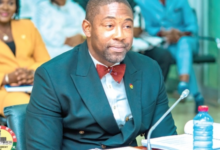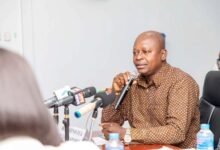pGhana’s macroeconomic outlook is now better than five years ago when she went in for the IMF programme Dr Albert Tourna Mama, Ghana’s Resident Representative at the International Monetary Fund (IMF), has said.
He noted that for the first time in a decade, Ghana achieved a primary surplus in 2017 and 2018, while the key macroeconomic indicators were trending positively.
He expressed the belief that some efficient policies rolled out by the Bank of Ghana (BoG) and the Finance Ministry played a pivotal role in the success story.
Dr Tourma Mama, who is a member of the committee that reviewed Ghana’s IMF programme recently, announced that it would present its final report to the Executive Board of the IMF yesterday, March 20, and chart the way forward towards sustaining the country’s economy for accelerated growth.
Dr Tourna Mama made the remarks when contributing to a panel discussion on Ghana’s macroeconomic environment and how it could attract private sector investment at the ongoing Africa Climate Week (ACW) at the Accra International Conference Centre.
The 2019 Africa Climate Week (ACW) is being held under the theme: ‘Climate action in Africa: A race we can win’.
The five-day event, organised by the United Nations Framework Convention on Climate Change (UNFCCC), the Government of Ghana and United Nations Development Programme (UNDP), brought together diverse actors from the public and private sectors to firm up the action plan to deal with the negative effects of climate change.
For instance, he said, the BoG cut the monetary policy rate by more than 400 basis points, and at the last Monetary Committee Meeting in January, this year, the bank also cut the monetary rate from 100 per cent to 60 per cent, which were positive achievements.
Those positive outcomes, Dr Mama said, culminated in the high rating given the nation by the Standard and Poor’s, an international rating agency, last year in addition to the high patronage of the government’s Eurobond issued on the global market last year.
He said one of the key conditions with the IMF programme was to strengthen domestic revenue mobilisation and create space for increase in taxes.
Therefore, the landmark legislation presented to Parliament last week was to rationalise tax exemption and increase investment in certain sectors of the economy as well as increase financial viability of some public institutions.
Mr Yaw Anso, a Senior Policy Advisor to the Ministry of Finance, said government’s policies, rolled out in 2017, aided in stabilising and sanitising the macroeconomic environment, which would attract investment to drive economic growth.
He said the nation required innovative solution hence it implemented regulatory and legal policies to engender industrial revolution in addition to the Planting for Food and Jobs, Free Senior High School, and the Revised Company’s Code among other policies.
Mr Anso, for instance, said the country’s economic growth moved from 3.6 per cent in 2016 to 8.1 per cent in 2017 and 5.6 per cent in 2018 adding that that momentum would be maintained.
He said the country’s fiscal deficit of over seven per cent had reduced, inflation declined from 15.4 per cent to 9.2 per cent and monetary policy rate down to 17 per cent from 25 per cent.
In spite of the recent turbulence experienced by the local currency, the exchange rate remained relatively stable, while government was putting in place aggressive measures to tackle the regulatory environment, which determined the environment for doing business in order to improve Ghana’s ranking on doing business, he said.
Mr Anso said it was laudable that the “Ghana Beyond Aid” Committee, which he was a member, submitted its report to the President and one of the policy’s key pillars was to ensure economic sustainability without hurting the business environment.
The Policy Advisor said government had been supporting start-ups, entrepreneurs and venture capitals and believed in leveraging on the private sector in the quest to drive green economic growth revolution.
He said the nation had sufficient expertise to ensure fiscal discipline, especially with the passage of the Fiscal Responsibility Act, to cap annual budget deficit to five per cent of the Gross Domestic Product.
More than 1,000 participants across Africa and the world are attending the ACW conference and these include government agencies, international partners, donor agencies and multi-stakeholders to discuss action plans to mitigate the negative impact of climate change.
The ACW serves as a lead-up to the UN Secretary-General’s Climate Summit in September, this year.
GNA







